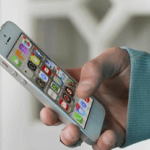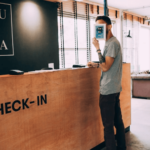Mobile devices are essential elements in our daily lives. Despite starting out as a way to keep in contact, phones have evolved into a key information source.
Conversion rates have increased by 88% on mobile travel sites. A mobile marketing strategy is no longer optional.
Here are ten ways you can innovate your mobile travel marketing strategy in 2017:
- Location Based Services
Location data is one of the essential tools for businesses in the travel industry. With 56% of smartphone users making local searches, optimizing your business to be discovered is a must.
Make sure your business is also discoverable on Google, Instagram, or Foursquare. Travelers take advantage of a variety of location-enabled features on social media platforms before and during a trip.
Whether to find the nearest restaurant, read reviews, or take part visual trip inspiration, localized search results play a big part in a consumer’s decision-making process.
- Mobile Service
With 40% of millennials preferring online customer service, the way businesses provide their services to consumers needs to evolve.
Guests often no longer want to deal with a person. Instead, they want a self-service experience that allows them to book a tour at midnight or order food directly from their phones without a language barrier.
To take advantage of this trend, think about how to take your offers online and make them more mobile-friendly for consumers.
- Mobile SEO Practices
It is essential to have strong SEO practices in place along with a mobile-friendly website to remain relevant and competitive.
Here are some of the most important ways to optimize for a positive mobile experience:
- Responsive web pages. A responsive site design optimizes the layout of your website for mobile users and prevents a frustrating user experience.
- Enable dynamic serving. Dynamic serving allows a server to detect the type of device and then loads the appropriate content onto that URL.
- Keyword and content optimization. Choose keywords that are mobile user-specific and make sure the length of your content is optimized for mobile devices.
- Personalisation
In November 2010, KLM Airlines decided to surprise its customers. Using social media, their flight attendants tracked down guests who mentioned they were flying with KLM that day.
Then, using information flyers provided on social media, the flight attendants surprised their guests with a suitable gift.
Creating a personalized experience does not need to be an as in-depth as KLM’s social experiment, but it does show the untapped power of social sleuthing.
Spend time getting to know your customers and making it a priority to form relationships with them.
By doing this, it will help create a personalized experience that will delight your customers and make them want to share their experience with the world.
- Problem Solving
To delight our customers, we need to anticipate their needs and provide solutions to unanticipated problems.
Think about your customer’s journey and the problems they might encounter – even if it does not directly relate to your services.
For example, when a traveler lands in a new country, their first obstacle is usually getting to their hotel.
Hotels can provide guests directions in the local language, an interactive list of transport options available or help guests avoid being ripped off with cab fare estimates.
- Incentivize with Social Media
With nearly 80% of social media time taking place on mobile, being active on various platforms is an excellent way to stay connected to your customers.
Businesses in the travel industry can use social media use to encourage users to check-in, post photos, or leave reviews. If you are struggling to get organic interaction – incentivise your consumers.
Restaurants, hotels, and tour operators can give discounts if a user leaves a review on Facebook, tags and uploads a photo on Instagram, or retweets a post on Twitter.
- Mobile-Friendly Offline Functionality
The need to provide offline functionality on mobile devices has become increasingly more important.
While traveling through a foreign country, Wifi is not always available, and expensive roaming charges leave many mobile devices permanently on airplane mode.
For businesses in the tourism industry, it is important to think about how offline functionality can solve your customer’s problems.
Hotels could provide a detailed offline destination guide or an interactive map of nearby attractions.
By taking the time to assess your guest’s needs, you can come up with a valuable piece of offline content that will enrich their experience.
- Mobile AdWords Strategy
If you own a hotel, you might be in a hotly contested battle on Google AdWords for keywords like “hotels in Las Vegas,” and you are probably not seeing any desirable results.
The reason for this is because you are focusing on how people travel instead of why. No one books a vacation because of a hotel; people travel to experience a destination.
By targeting consumers while they are searching for an experience or an event, it will open you up to unique, low competition keywords and it will get you in front of your customer before your competition.
- Target Impulse Buyers
Armed with the power of a smartphone, consumers are free to make last-minute bookings any time of day.
According to a study by Phocuswright and Adara, almost 25% of availability searches take place on either the same day or next-day check-in.
This information represents a huge opportunity to businesses in the travel industry to take advantage of the “we want it now” culture.
One of the best ways to do this is to ensure your mobile app or website has online booking functionality.
You want to make it as easy as possible for consumers to make that purchase and give them no reason to leave for a competitor’s website.
- Augmented Reality
Augmented reality is revolutionizing the travel experience. It gives guests the chance to plan their journey in a seamless, interactive manner straight from their mobile device.
AR allows a user to take a virtual tour of a hotel room, browse menus by interacting with the menu and check out amenities like swimming pools and spa facilities all from the comfort of their own home.
Augmented reality allows consumers to plan in a much more interactive way and gives them a tangible way to experience their vacation before they arrive.
By taking advantage of the mobile marketing tips and innovating your strategy, you can capitalize on unique opportunities and differentiate your brand in one of the most saturated and competitive industries.
Author Bio: Shawn Parrotte is a musician, photographer, and digital marketer. He manages all the branding and marketing efforts at Designli, a custom mobile app development agency located in beautiful Greenville, SC.





